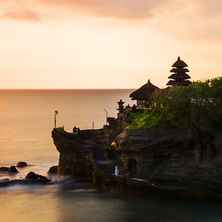
Hotels in Bali
Destinations to Discover






Why Pay More
When You Can Pay Less?

Popular Hotels in Bali

Discover what you like
Stay near exciting spots
Plenty of options, whatever your occasion
Đăng ký để sử dụng coupon
8% giảm giá Khách sạn
Giảm ngay 50K
8% giảm Hoạt động Du lịch
12% giảm Đưa đón sân bay
10% giảm Thuê xe

More about Bali
Introduction
Bali, often referred to as the "Island of the Gods," is one of the most popular travel destinations in the world. Known for its stunning beaches, lush rice terraces, vibrant culture, and spiritual heritage, Bali offers something for every traveler. Whether you're seeking a luxurious beachfront resort, a cozy boutique hotel, or a budget-friendly guesthouse, Bali's accommodations cater to all preferences and budgets. This guide will help you find the perfect hotel in Bali, while also exploring the best areas to stay, places to eat, and must-visit attractions.
History of Bali
Bali’s rich history dates back thousands of years, with its culture deeply influenced by Hinduism, which arrived on the island around the 1st century AD. Over centuries, Bali has evolved into a unique blend of spirituality, art, and tradition.
During the colonial era, Bali was part of the Dutch East Indies, and its beauty was first introduced to the world by Western artists and writers. Despite modernization, the island has preserved its traditions, which are evident in its temples, ceremonies, and festivals.
Today, Bali is a global hub for tourism, attracting visitors with its natural beauty, cultural richness, and world-class hospitality.
How to Book a Hotel in Bali at a Good Price
Use Traveloka for Seamless Booking
Traveloka offers an extensive range of accommodations in Bali, from budget-friendly stays to opulent resorts. Features include:
- Diverse Options: Browse hotels, villas, and guesthouses that cater to various budgets.
- Exclusive Deals: Enjoy discounts and app-only promotions.
- Verified Reviews: Read authentic reviews from other travelers to make an informed decision.
Book During Off-Peak Seasons
Bali’s peak season runs from July to August and December during the Christmas and New Year holidays. To secure better prices and avoid crowds, consider traveling during the shoulder months of May-June and September.
Plan Ahead and Stay Flexible
Booking your hotel in advance can help you lock in lower rates. Look for accommodations with flexible cancellation policies to adapt to any changes in your travel plans.
Monitor Promotions
Traveloka frequently offers promotions for Bali hotels, especially during special holidays or events. Keep an eye on these deals to enjoy significant savings on your stay.
Where to Stay in Bali
Bali offers a wide variety of accommodations tailored to meet every traveler’s needs, from luxury resorts and boutique villas to budget-friendly hostels. Each area on the island provides a distinct atmosphere, making it essential to choose your location based on the type of experience you seek.
Kuta: For Beach Lovers and Partygoers
Kuta is Bali’s most famous tourist hotspot, known for its vibrant nightlife, bustling streets, and wide sandy beaches. Staying in Kuta offers easy access to bars, nightclubs, shopping centers, and surf-friendly beaches. The area is particularly popular among younger travelers and those looking for an energetic atmosphere.
- Recommended Hotels:Hard Rock Hotel Bali is a family-friendly resort with a lively pool area and entertainment, while Bali Garden Beach Resort offers beachfront luxury with tropical gardens.
- Who It’s For: Ideal for surfers, budget travelers, and those seeking nightlife and entertainment.
Seminyak: Trendy and Upscale
Seminyak is a sophisticated beach town known for its boutique shops, fine dining, and high-end resorts. The vibe here is more relaxed compared to Kuta, with chic beach clubs and luxury spas making it a favorite among couples and honeymooners.
- Recommended Hotels:Alila Seminyak provides beachfront opulence with modern amenities, while The Oberoi Beach Resort blends Balinese architecture with lush gardens.
- Who It’s For: Perfect for travelers seeking luxury, couples on romantic getaways, and those who enjoy a trendy atmosphere.
Ubud: Cultural and Spiritual Retreat
Ubud, nestled in the heart of Bali, is a haven for culture enthusiasts and wellness seekers. Surrounded by rice terraces, temples, and art galleries, Ubud offers a serene and spiritual escape. It’s also home to numerous yoga retreats and wellness centers.
- Recommended Hotels:Hanging Gardens of Bali offers breathtaking jungle views and private infinity pools, while The Purist Villas & Spa provides a tranquil retreat with a focus on wellness.
- Who It’s For: Ideal for solo travelers, yoga practitioners, and those seeking cultural immersion.
Canggu: Hip and Laid-Back
Canggu has become a trendy destination for digital nomads and surfers, with a mix of coworking spaces, hip cafés, and beach clubs. The area is known for its laid-back vibe and picturesque rice paddies.
- Recommended Hotels:Como Uma Canggu combines luxury with surf culture, while The Slow offers minimalist boutique accommodations.
- Who It’s For: Great for digital nomads, young travelers, and surf enthusiasts.
Nusa Dua: Tranquil Luxury
Nusa Dua is Bali’s premier resort destination, known for its pristine beaches and upscale resorts. The area is perfect for families and honeymooners looking for a quiet and luxurious stay.
- Recommended Hotels:The Mulia, Bali offers world-class luxury and impeccable service, while St. Regis Bali Resort provides private villas and stunning beachfront views.
- Who It’s For: Best for families, honeymooners, and those seeking relaxation in a secluded environment.
Bali’s diverse accommodation options ensure that every traveler finds the perfect place to stay, whether it’s a lively beachfront hotel or a serene jungle retreat.
Best Places to Eat in Bali
Bali’s culinary scene is as diverse as its landscapes, offering everything from authentic local dishes at roadside warungs to gourmet cuisine in high-end restaurants. The island is a paradise for food lovers, with something to suit every palate.
Warungs: Authentic Local Flavors
Warungs are small, family-owned eateries that serve traditional Balinese and Indonesian dishes at affordable prices. Dining at a warung is an excellent way to experience Bali’s authentic flavors.
- Top Picks:Warung Babi Guling Ibu Oka in Ubud is famous for its babi guling (roast suckling pig). Warung Mak Beng in Sanur offers delicious fish soup and fried fish.
- Must-Try Dishes:Nasi goreng (fried rice), mie goreng (fried noodles), satay lilit (Balinese satay), and lawar (a traditional Balinese salad).
Fine Dining Restaurants
Bali is home to a thriving fine-dining scene, blending local ingredients with international techniques. Many high-end restaurants are located in Ubud, Seminyak, and Jimbaran, offering world-class dining experiences.
- Top Picks:Locavore in Ubud is an award-winning restaurant known for its innovative use of local produce. Mozaic Restaurant Gastronomique offers a fine-dining experience with French-Asian fusion dishes.
- Why Visit: These restaurants provide not only exquisite meals but also a chance to experience Bali’s culinary artistry.
Beach Clubs: Dining with a View
Bali’s beach clubs are perfect for combining dining, relaxation, and entertainment. These venues offer stunning ocean views, delicious food, and vibrant nightlife.
- Top Picks:Potato Head Beach Club in Seminyak serves a mix of local and international dishes with craft cocktails. Finns Beach Club in Canggu is known for its laid-back vibe and all-day dining.
- Signature Dishes: Seafood platters, gourmet burgers, and tropical desserts.
Vegan and Healthy Cafés
Bali’s wellness culture has given rise to an impressive array of vegan and healthy eateries. These cafés focus on organic, locally sourced ingredients.
- Best Spots:Alchemy in Ubud specializes in raw and organic dishes, while The Shady Shack in Canggu offers creative vegan options like smoothie bowls and jackfruit tacos.
- Why Visit: Perfect for health-conscious travelers and those with dietary restrictions.
Jimbaran Bay: Fresh Seafood
Jimbaran Bay is famous for its seafood restaurants located right on the beach. Dining here offers the opportunity to enjoy freshly grilled fish, prawns, and crabs while watching the sunset.
- Top Picks:Menega Café and Jimbaran Beach Club are popular choices for a seafood feast.
- Must-Try Dishes: Grilled fish with sambal, lobster, and calamari.
Bali’s culinary diversity ensures every meal is a delightful experience, whether you’re indulging in street food or savoring a gourmet dinner by the sea.
Best Places to Visit in Bali
Bali’s stunning natural beauty, rich culture, and spiritual heritage make it a destination filled with unforgettable attractions. From iconic temples to pristine beaches, here are the must-visit places in Bali.
Uluwatu Temple
Perched on a cliff overlooking the Indian Ocean, Uluwatu Temple is one of Bali’s most iconic landmarks. This sea temple is not only a place of worship but also a stunning viewpoint for sunsets.
- Highlights: Attend the evening Kecak fire dance performance, which tells a traditional Balinese story through music and movement. The panoramic views of the ocean are breathtaking.
- Best Time to Visit: Late afternoon for the sunset and cultural performance.
Tegallalang Rice Terraces
Located near Ubud, the Tegallalang Rice Terraces are a symbol of Bali’s agricultural heritage. The lush green terraces provide a picturesque backdrop for photos and leisurely walks.
- Activities: Walk through the terraces, try the famous Bali Swing, and enjoy coconut water at nearby cafés.
- Cultural Insight: Learn about the traditional subak irrigation system, which reflects Bali’s community-centered philosophy.
Sacred Monkey Forest Sanctuary
This lush forest in Ubud is home to hundreds of playful monkeys and ancient temples. The sanctuary combines natural beauty with spiritual significance.
- Highlights: Visit the three temples within the forest and observe the monkeys in their natural habitat.
- Pro Tip: Keep personal belongings secure, as the monkeys are known for their curiosity.
Tanah Lot Temple
Tanah Lot is one of Bali’s most photographed landmarks. This sea temple is perched on a rock formation and is especially stunning during sunset.
- What to Do: Explore the temple grounds during low tide and browse the local market nearby for souvenirs.
- Best Time to Visit: Early morning or late afternoon to avoid crowds.
Mount Batur
For adventure enthusiasts, trekking to the summit of Mount Batur for sunrise is an unforgettable experience. The hike offers spectacular views of Lake Batur and the surrounding volcanic landscape.
- What to Expect: The trek takes about 2-3 hours, and guides are recommended for safety.
- Post-Hike Treat: Enjoy breakfast cooked with volcanic steam at the summit.
Nusa Islands
The Nusa Islands—Nusa Penida, Nusa Lembongan, and Nusa Ceningan—are known for their crystal-clear waters, dramatic cliffs, and excellent snorkeling and diving spots.
- Top Attractions: Kelingking Beach on Nusa Penida, Devil’s Tears on Nusa Lembongan, and the Blue Lagoon on Nusa Ceningan.
- Activities: Snorkeling with manta rays, cliff jumping, and relaxing on secluded beaches.
Bali’s diverse attractions ensure that every traveler finds something to love, whether it’s cultural landmarks, natural wonders, or thrilling adventures.
Best Time to Visit Bali
Bali’s tropical climate makes it an attractive year-round destination, but understanding its weather patterns and key events can help you choose the best time to visit based on your preferences and activities.
Bali’s Seasons: Dry Season and Wet Season
Bali has two distinct seasons: the dry season (April to October) and the wet season (November to March). Each season offers unique experiences and advantages.
Dry Season (April to October):
- The dry season is the most popular time to visit Bali, characterized by sunny days, low humidity, and minimal rainfall. Temperatures average between 26°C and 30°C, making it perfect for outdoor activities like beach visits, trekking, and water sports.
- Why Visit During Dry Season: This period is ideal for exploring Bali’s iconic attractions like Uluwatu Temple, Tegallalang Rice Terraces, and Mount Batur. Beach enthusiasts can enjoy pristine conditions on Bali’s famous shores, including Seminyak, Kuta, and Nusa Dua.
- Considerations: Being peak tourist season, especially from July to August and during Christmas and New Year, expect higher prices for accommodations and more crowded attractions.
Wet Season (November to March):
- The wet season brings heavier rainfall, often in short bursts during the afternoon or evening. Humidity levels are higher, but temperatures remain warm, ranging from 24°C to 31°C.
- Why Visit During Wet Season: This period offers fewer crowds and lower accommodation rates. The lush green landscapes of Bali’s rice terraces and forests are at their most vibrant. It’s also a great time for cultural experiences and relaxation at spas and resorts.
- Considerations: Some outdoor activities, like trekking and diving, may be limited due to rain. However, many indoor activities, such as visiting museums, temples, and wellness retreats, remain unaffected.
Peak Travel Times
- July to August: These are the busiest months in Bali, coinciding with the European summer holiday season. The weather is perfect, but beaches and attractions can be crowded.
- December to January: Bali experiences another surge in visitors during the Christmas and New Year holidays. While this is an exciting time with celebrations and parties, it’s essential to book accommodations and tours well in advance.
Shoulder Seasons: May to June and September
- The shoulder seasons are the best times to visit Bali for pleasant weather and fewer crowds. Temperatures are comfortable, and rainfall is minimal, making it ideal for outdoor adventures and cultural exploration.
Seasonal Highlights
- Surfing: The dry season is perfect for surfing on Bali’s western beaches like Uluwatu and Kuta, while the wet season offers better conditions on the eastern beaches like Nusa Dua.
- Festivals: Bali hosts numerous cultural events throughout the year. Notable ones include Nyepi Day (Balinese Day of Silence) in March, Galungan and Kuningan (celebrating the victory of good over evil), and Bali Arts Festival in June.
Understanding Bali’s seasons and key events will help you plan your visit to align with your interests, ensuring an unforgettable experience on this enchanting island.
Things to Know When Traveling to Bali
Bali’s unique blend of natural beauty, cultural richness, and modern amenities makes it an appealing destination. However, being prepared with essential information will enhance your travel experience and help you navigate the island smoothly.
Transportation in Bali
- Getting Around: Bali does not have a comprehensive public transport system, so most visitors rely on taxis, motorbike rentals, or private drivers. Ride-hailing apps like Grab and Gojek are widely used, especially in tourist areas like Seminyak and Kuta.
- Motorbike Rentals: Renting a motorbike is an affordable and flexible way to explore Bali. However, ensure you have an international driver’s license, and always wear a helmet for safety.
- Private Drivers: Hiring a private driver for a day is a convenient option for exploring multiple attractions. Drivers often act as guides, sharing insights about the places you visit.
Currency and Payments
- Currency: The local currency is the Indonesian Rupiah (IDR). ATMs are widely available in tourist areas, but it’s a good idea to carry cash for small transactions.
- Credit Cards: While major hotels and restaurants accept credit cards, smaller vendors and local warungs typically operate on a cash-only basis.
- Tipping: Tipping is not mandatory but is appreciated. For good service, tip around 10% at restaurants or round up taxi fares.
Health and Safety
- Food and Water: Avoid tap water in Bali and opt for bottled or boiled water. Stick to well-reviewed restaurants for street food to minimize the risk of foodborne illnesses.
- Travel Insurance: Ensure you have comprehensive travel insurance that covers medical emergencies, accidents, and adventure activities like diving or trekking.
- Sun Protection: Bali’s tropical sun can be intense, so pack sunscreen, sunglasses, and a wide-brimmed hat.
- Mosquito Protection: Carry mosquito repellent, as Bali is in a tropical region where mosquitoes are common.
Cultural Etiquette
- Temple Visits: Dress modestly when visiting temples, covering your shoulders and knees. Many temples provide sarongs at the entrance for visitors.
- Respecting Local Customs: Balinese people are deeply spiritual. Avoid disrupting ceremonies or entering sacred areas unless invited.
- Greetings: A simple smile and the phrase “Om Swastiastu” (a traditional Balinese greeting) are appreciated by locals.
Local Customs
- Nyepi Day (Day of Silence): This Balinese New Year celebration involves a day of silence, during which no activities, travel, or use of electricity are allowed. Tourists must stay within their hotels, but it’s a unique cultural experience to observe.
- Bargaining: Bargaining is common in markets and small shops. Always negotiate politely and with a smile.
Emergency Numbers
- Police: 112
- Ambulance: 118
- Tourist Police: The Tourist Police are helpful and can assist with various issues, including lost passports or scams.
By being informed and respectful of Bali’s culture and practices, you can ensure a smooth and enjoyable trip. With a little preparation, you’ll be ready to immerse yourself in the magic of the “Island of the Gods.”
Conclusion
Finding the perfect hotel in Bali is easy with Traveloka, offering a wide range of accommodations for all budgets and preferences. Whether you want to relax in a luxury resort, experience local culture in a boutique villa, or surf the waves near a laid-back guesthouse, Bali has it all. Start planning your dream getaway to the "Island of the Gods" today and immerse yourself in its magical charm.
Facts about hotel in Bali
Total Accommodation | 10,000 Properties |
Popular City | Ubud, Seminyak |
Popular Hotel | The Apurva Kempinski Bali, The Anvaya Beach Resort Bali |
Popular Landmark | Beachwalk Shopping Center, Kuta Beach |
Frequently asked questions

Guest reviews in hotel near Bali
Why book Accommodation in Traveloka?



We’ve got more than just hotels





















































 Facebook
Facebook Instagram
Instagram TikTok
TikTok Youtube
Youtube Telegram
Telegram